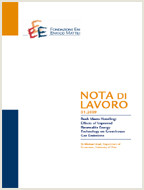Network Formation and Disruption – An Experiment – Are Efficient Networks too Complex?

12.06.2017
Sonja Brangewitz (Paderborn University); Behnud Mir Djawadi (Paderborn University); Angelika Endres (Paderborn University); Britta Hoyer (Paderborn University)
D03, D85, C91
Networks Experiment, Network Design, Network Defence, Network Disruption
Economic Theory and Applications
Carlo Carraro
We experimentally study the emergence of networks under a known external threat. To be more specific, we deal with the question if subjects in the role of a strategic Designer are able to form safe and efficient networks while facing a strategic Adversary who is going to attack their networks. This investigation relates theoretical predictions by Dziubinski and Goyal (2013) to actual observed behaviour. Varying the costs for protecting nodes, we designed and tested two treatments with different predictions for the equilibrium network. Furthermore, the influence of the subjects’ farsightedness on their decision-making process was elicited and analysed. We find that while subjects are able to build safe networks in both treatments, equilibrium networks are only built in one of the two treatments. In the other treatment, predominantly safe networks are built but they are not efficient. Additionally, we find that farsightedness -as measured in our experiment- has no influence on whether subjects are able to build safe or efficient networks.
***
Suggested citation: Brangewitz, S., B. M. Djawadi, A. Endres, B. Hoyer, (2017), ‘Network Formation and Disruption – An Experiment – Are Efficient Networks too Complex?’, Nota di Lavoro 30.2017, Milan, Italy: Fondazione Eni Enrico Mattei
